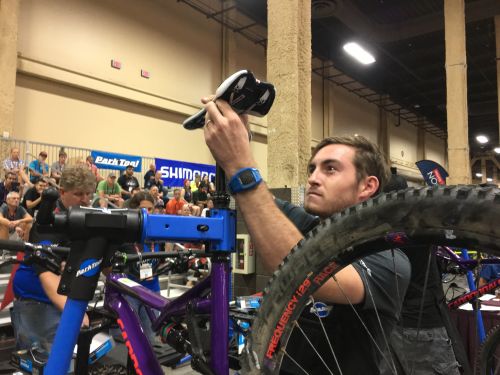By James Stanfill, president of the Professional Bicycle Mechanics Association
The Professional Bicycle Mechanics Association officially started on March 11, 2016, as a Facebook group. It quickly grew to 1,200, then 4,000, and today sits somewhere above 8,000 individuals, the vast majority of whom are working professionals in the industry. Since last March, the PBMA has accomplished a lot of work in a very short amount of time. Our legal entity was created, we successfully staffed and survived Interbike (whatever traffic was like for most, we were quite busy), and we've officially launched membership — and we're growing even more rapidly since the start of the new year.
As an organization that began simply as a conversation at the Race Mechanics Clinic in 2015, I want to focus going forward more on what the professionalism conversation looks like today and where it is headed. The days of telephone calls, face-to-face discussions and even simple civility and manners seem to have completely disappeared. The internet, some might say, is going to be the downfall of our civilized society. We have seen this played out within our Facebook group on a daily basis — the conversations frequently become unprofessional and, at times, veer so far away from professionalism that we've even been forced to temporarily close down topics and conversations.
Person-to-person interactions are typically civil, even if you aren't in total agreement with someone or believe in what they are saying. When you're face to face, a lighter touch is almost always taken, but in today's keyboard-and-screen world of instant insults being slung, unprofessional conversation and a generally inconsiderate attitude seem to rule all.
As an industry, we certainly aren't immune to the problems of the world. What we can do, however, is to identify issues now and create a path to correcting them. When we use the term "Professional," we are talking about more than being paid to perform a task. The reality of being a professional is far more than a paycheck; it's an attitude.
Professionalism itself is defined as "the competence or skill expected of a professional," and to be professional is defined as "the conduct, aims or qualities that characterize or mark a profession or a professional person." As the foundation to all of this, profession is defined as "a calling requiring specialized knowledge and often long and intensive academic preparation." As bicycle mechanics, we can only be truly professional once we establish a baseline of academic learning and a code of ethics, and define what specialized knowledge a person should have.
Simply receiving payment for a task does not make one a professional. Those prior definitions were taken directly from Merriam-Webster, so I'll trust them to be accurate and true. There are, of course, other variations. The above are simply the most fitting for this conversation. To be a professional is attitude, the way you treat others, the way you respect employees and customers, and the way you conduct yourself in person as well as online.
There are 8,000 pairs of eyes within our Facebook group and there are constantly important people reading and watching every word. Tossing out rash opinions in the same forum where you also may be applying for a job later isn't putting your best foot forward. Look at the comments on numerous industry websites now — many of those sites utilize your Facebook profile to post, and too many times do we see the running on of mouths. If you put it on the web, it's never truly gone.
In bicycle retail, we need to take a good hard look at why our customers are being driven elsewhere. Customers don't like to be spoken down to; they are walking in your store or service shop for a reason ... and walking out. They are coming for knowledge: You are the expert and they are the student. Rudeness, arrogance and ignorance is hurting us all.
What I am asking those of you who've taken the time to read through this commentary is to think twice, earn your business and win in the marketplace — don't give it away. Create community where you are and be a professional. The PBMA is working hard to create some basic standards to which we can all hold ourselves accountable, so to be a professional we must act, live and abide by professional standards.


